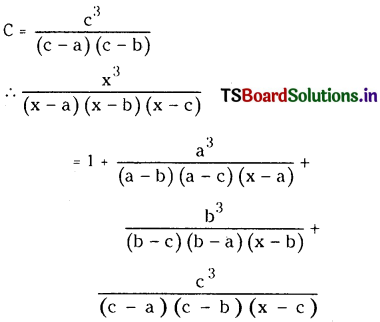Students must practice this TS Intermediate Maths 2A Solutions Chapter 7 Partial Fractions Ex 7(c) to find a better approach to solving the problems.
TS Inter 2nd Year Maths 2A Solutions Chapter 7 Partial Fractions Ex 7(c)
Resolve the following fractions into partial fractions.
Question 1.
\(\frac{x^2}{(x-1)(x-2)}\)
Solution:
The given rational fraction \(\frac{x^2}{(x-1)(x-2)}\) is improper with degree of numerater is equal
to degree of denominator.
∴ \(\frac{x^2}{(x-1)(x-2)}\) = 1 + \(\frac{r(x)}{(x-1)(x-2)}\)
Let \(\frac{x^2}{(x-1)(x-2)}\) = 1 + \(\frac{A}{x-1}+\frac{B}{x-2}\)
⇒ (x – 1) (x – 2) + A (x – 2) + B (x – 1) = x2 …………..(1)
Substituting x = 1 in (1), we get
– A = 1
⇒ A = – 1
Substituting x = 2 in (1), we get
B = 4
∴ \(\frac{x^2}{(x-1)(x-2)}\) = 1 – \(\frac{1}{x-1}+\frac{4}{x-2}\).
![]()
Question 2.
\(\frac{x^3}{(x-1)(x+2)}\)
Solution:
The given rational fraction \(\frac{x^3}{(x-1)(x+2)}\) is improper with degree of numerator is greater than degree of denominator.
Clearly
\(\frac{x^3}{(x-1)(x+2)}\) = (x – 1) + \(\frac{3 x-2}{(x-1)(x+2)}\)
Let \(\frac{3 x-2}{(x-1)(x+2)}\) = \(\frac{A}{(x-1)}+\frac{B}{x+2}\)
⇒ A (x + 2) + B(x – 1) = 3x – 2 …………..(1)
Substituting x = 1 in (1), we get
3A = 1
⇒ A = \(\frac{1}{3}\)
Substituting x = – 2 in (1), we get
– 3B = – 8
⇒ B = \(\frac{8}{3}\)
∴ \(\frac{x^3}{(x-1)(x+2)}\) = x – 1 + \(\frac{1}{3(x-1)}+\frac{8}{3(x+2)}\).
![]()
Question 3.
\(\frac{x^3}{(2 x-1)(x-1)^2}\)
Solution:
The given rational fraction \(\frac{x^3}{(2 x-1)(x-1)^2}\) is improper as degree of numerator is equal to degree of denominator.
Clearly \(\frac{x^3}{(2 x-1)(x-1)^2}=\frac{1}{2}+\frac{r(x)}{(2 x-1)(x-1)^2}\)
Let \(\frac{x^3}{(2 x-1)(x-1)^2}\) = \(\frac{1}{2}\) + \(\frac{A}{(2 x-1)}+\frac{B}{(x-1)}+\frac{C}{(x-1)^2}\)
⇒ (2x – 1) (x – 1)2 + 2A (x – 1)2 + 2B (2x – 1)(x – 1) + 2C (2x – 1) = 2x3 ………..(1)
Substituting x = 1 in (1), we get C = 1
Substituting x = \(\frac{1}{2}\) in (1), we get
\(\frac{\mathrm{A}}{2}=\frac{1}{4}\)
⇒ A = \(\frac{1}{2}\)
Substituting x = 0 in (I), we get
– 1 + 2A + 2B – C = 0
⇒ – 1 + 1 + 2B – 2 = 0
⇒ B = 1
∴ \(\frac{x^3}{(2 x-1)(x-1)^2}\) = \(\frac{1}{2}+\frac{1}{2(2 x-1)}+\frac{1}{x-1}+\frac{1}{(x-1)^2}\).
![]()
Question 4.
\(\frac{x^3}{(x-a)(x-b)(x-c)}\)
Solution:
The given rational fraction \(\frac{x^3}{(x-a)(x-b)(x-c)}\) is improper as degree of numerator is equal to degree of denominator.
Let \(\frac{x^3}{(x-a)(x-b)(x-c)}\) = 1 + \(\frac{A}{x-a}+\frac{B}{x-b}+\frac{C}{x-c}\)
⇒ (x – a) (x – b) (x – c) + A (x – b) (x – c) + B (x – a) (x – c) + C (x – a) (x – b) = x3 ………..(1)
Substituting x = a in (1), we get,
A (a – b) (a – c) = a3
⇒ A = \(\frac{a^3}{(a-b)(a-c)}\)
Substituting x = b in (1), we get.
B = \(\frac{b^3}{(b-c)(b-a)}\)
Substituting x= c in (1), we get
